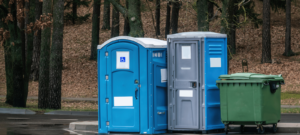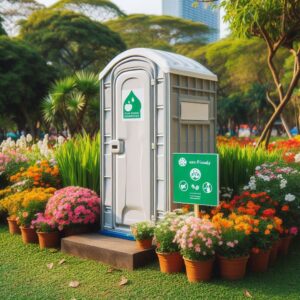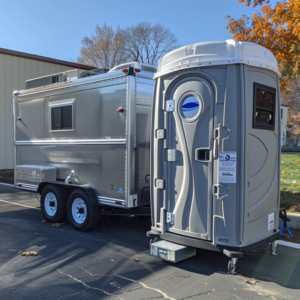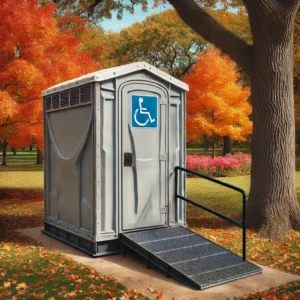Where Does Porta Potty Waste Go: Lifecycle of Porta Potty Waste
Have you ever wondered about the journey of porta potty waste and “Where Does Porta Potty Waste Go” after you’ve used a portable restroom at a public event or construction site? The fate of porta potty waste involves a fascinating and essential process that ensures both hygiene and environmental responsibility. Porta potties, or portable toilets, are ubiquitous at outdoor events, festivals, construction sites, and even on film sets. These temporary sanitation solutions serve a crucial purpose, providing convenient facilities where conventional plumbing is unavailable or impractical.
After you’ve used a porta potty, the waste doesn’t simply disappear. It undergoes a carefully managed lifecycle that begins with collection. Service providers, equipped with specialized trucks, regularly visit sites to pump out the waste from porta potties. This process involves suctioning out the waste into onboard tanks, which are designed to contain and transport it safely. Once collected, the journey of porta potty waste continues to a treatment facility. At these facilities, the Waste of Porta Potty undergoes thorough processing. This includes separating solids from liquids, breaking down organic matter through biological processes, and disinfecting to neutralize harmful pathogens.
Ultimately, the treated waste can be repurposed in various beneficial ways, such as fertilizing agricultural fields or generating biogas for energy. This ensures that even something as seemingly disposable as porta potty waste can be part of a sustainable cycle, minimizing environmental impact while supporting essential sanitation needs. Join us as we delve deeper into the lifecycle of porta potty waste, exploring the intricate steps that ensure sanitation and environmental stewardship in our communities.
Waste Management In Portable Toilets
Waste management in portable toilets is crucial for maintaining hygiene and environmental responsibility in various settings and the question is “Where Does Porta Potty Waste Go” from construction sites to outdoor events? Here are key considerations and practices:
- Regular Servicing: Scheduled emptying and cleaning are essential to prevent overflow and maintain sanitation standards. Depending on usage, this may range from daily to weekly servicing.
- Proper Disposal: Waste from portable toilets should be disposed of in designated facilities that comply with environmental regulations. This often involves specialized waste treatment plants or sewage systems.
- Chemical Treatments: Many portable toilets use chemical additives to control odors, break down waste, and disinfect surfaces. These chemicals need to be handled and disposed of safely.
- Monitoring and Maintenance: Regular inspection of toilets ensures early detection of leaks, damage, or malfunctions that could lead to environmental contamination or user discomfort.
- Education and Awareness: Users should be informed about proper usage to prevent misuse or damage to the facilities. Clear signage can help guide users on waste disposal and hygiene practices.
- Environmental Impact: Sustainable waste management practices, such as using biodegradable chemicals and minimizing water usage, can reduce the environmental footprint of portable toilet operations.
Effective waste management in portable toilets not only promotes health and safety but also demonstrates responsible stewardship of the environment in temporary or remote locations. By adhering to these practices, operators and users alike contribute to a cleaner and safer environment for all.
How does the disposal of waste work in portable toilets?
Disposal of waste in portable toilets is crucial to maintaining hygiene and ensuring environmental responsibility. Here’s a breakdown of how it typically works:
- Collection: Waste in portable toilets is collected in a holding tank located beneath the toilet seat. This tank is designed to securely hold the waste until it can be properly disposed of.
- Chemical Treatment: Most portable toilets use chemical treatments to break down waste and control odor. These chemicals often include biocides and deodorizers that help in decomposition and neutralization.
- Regular Servicing: Portable toilets require regular servicing by sanitation companies or designated personnel. They pump out the waste from the holding tanks and replenish the chemical treatments as needed.
- Transportation: Once the waste is pumped out, it is transported to treatment facilities or disposal sites. These facilities are equipped to handle and treat human waste in an environmentally safe manner.
- Treatment and Disposal: At the treatment facility, the waste undergoes further processing. This may involve filtration, chemical treatment, or composting depending on local regulations and environmental considerations.
- Reuse or Disposal: Treated waste may sometimes be converted into reusable by-products like compost for non-edible plants or energy production through anaerobic digestion. Otherwise, it is disposed of safely in accordance with local laws.
Overall, the disposal facilities in porta potties involve a coordinated effort between users, service providers, and treatment facilities to ensure cleanliness, sanitation, and minimal environmental impact.
Is Waste Management in Porta Potties Environment-Friendly?
Waste management in porta potties can indeed be considered environment-friendly when managed properly, though it requires conscientious effort. Porta potties, commonly used at outdoor events, construction sites, and temporary gatherings, offer a sanitary solution without the need for extensive plumbing infrastructure. The environmental benefits stem from their ability to conserve water and reduce the strain on traditional sewage systems.
These portable toilets typically use chemicals and microbial treatments to break down waste and control odors. When handled correctly, these chemicals can minimize environmental impact by accelerating decomposition and neutralizing harmful pathogens. Furthermore, many porta potty rental companies prioritize eco-friendly practices by using biodegradable chemicals and promoting responsible waste disposal methods.
However, challenges remain. Improper maintenance or disposal can lead to pollution if waste leaks or chemicals are released into the environment. To mitigate these risks, rigorous maintenance schedules and adherence to local regulations are crucial. Properly trained personnel ensure that waste is safely transported and processed at treatment facilities designed to handle portable toilet waste.
In summary, while porta potties offer a convenient and often more sustainable alternative to conventional restroom facilities, their environmental friendliness hinges on responsible management practices throughout their lifecycle—from chemical use to waste disposal. With careful attention to detail and adherence to best practices, porta potties can contribute positively to environmental conservation efforts.
Frequency of waste removal Depending on usage
The frequency of waste removal in porta potties is crucially dependent on usage patterns and the number of people utilizing them. Porta potties, commonly found at events, construction sites, and outdoor gatherings, require regular servicing to ensure cleanliness and functionality.
For high-traffic events such as festivals or concerts, porta potties may need to be serviced multiple times a day to accommodate the large volume of users. This ensures that users have access to clean facilities throughout the event, enhancing overall attendee satisfaction and meeting sanitation standards. Event organizers often coordinate with portable restroom service providers to establish a schedule that aligns with peak usage times and ensures a positive experience for attendees.
Similarly, on construction sites where porta potties are essential for workers’ convenience and compliance with health regulations, the frequency of waste removal is typically determined by the number of workers present and the duration of the project. Depending on these factors, porta potties may be serviced weekly, bi-weekly, or more frequently as needed to maintain hygienic conditions. In contrast, porta potties in less frequented locations or during quieter periods may require less frequent servicing, such as weekly or bi-weekly visits, to manage waste levels effectively without compromising cleanliness and usability.
Conclusion:
The lifecycle of porta potty waste intricately navigates through various stages, each crucial in ensuring environmental sustainability and public health. Understanding “Where Does Porta Potty Waste Go” begins with its initial use, where these portable facilities provide essential sanitation solutions in diverse settings, from construction sites to outdoor events. Once utilized, the waste undergoes systematic collection processes managed by specialized service providers. This stage is pivotal in maintaining cleanliness and preventing environmental contamination, as waste is carefully transported to treatment facilities equipped to handle such biohazardous materials.
Treatment facilities play a pivotal role in the safe disposal and management of porta potty waste, employing advanced technologies to sanitize and process the waste efficiently. Methods such as chemical treatment, composting, or anaerobic digestion are employed based on environmental considerations and local regulations. These processes ensure that harmful pathogens are neutralized and that the final by-products are rendered safe for disposal or potential reuse in beneficial applications.
Ultimately, the journey of where porta potty waste goes underscores the importance of responsible waste management practices. By adhering to stringent protocols and utilizing innovative technologies, the industry not only ensures public health and environmental protection but also contributes to sustainable resource management. As demands for portable sanitation solutions continue to evolve, so too must our commitment to efficient waste handling and environmental stewardship.
Looking for an Affordable Porta Potty Rental or Cheap Portable Toilets Rental in Fresno for events and construction sites? Clean, reliable, and budget-friendly solutions. Book now and ensure hygiene with a click!





